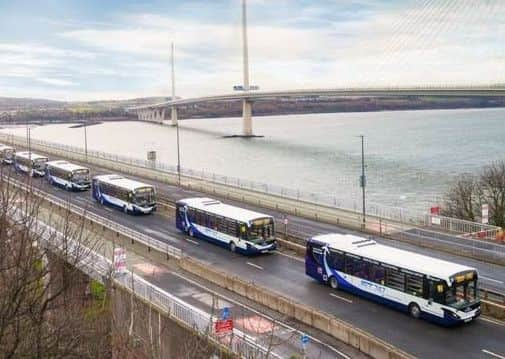Driverless buses to start Edinburgh-Fife journeys within months
This article contains affiliate links. We may earn a small commission on items purchased through this article, but that does not affect our editorial judgement.
and live on Freeview channel 276
Bus giant Stagecoach will operate the new trial service, expected in 2020, which will see five single-deck buses carrying 42 passengers travelling 14 miles from Ferrytoll Park and Ride in Fife to the Edinburgh Park tram exchange, near the Gyle.
With buses every 20 minutes, this could provide an estimated 10,000 weekly journeys.
Advertisement
Hide AdAdvertisement
Hide AdThe buses will be used autonomously to “level four” standard, meaning a driver must remain on board during any journey in line with UK regulations.


The initiative is part of a UK-wide trial of driverless vehicles, which will see two other pilots of “autonomous” taxi services taking place in London. The Scottish scheme received £4.35 million of a £25m UK grant to help make driverless technology on UK streets a reality.
Scottish Government Transport Secretary Michael Matheson said: “This is a very exciting development and underlines the potential Scotland has when it comes to connected and autonomous vehicles. The Forth has been at the centre of engineering innovation over three centuries and it is fitting that it will be central to this next innovation in transport and our Programme for Government commitments to intelligent mobility.
“The deployment of these vehicles in Scotland will bring transformative change to the way we travel and work, as well as having a positive impact on the economy, the environment and safety.”


Advertisement
Hide AdAdvertisement
Hide AdWork on the vehicles is being carried out at busmaker Alexander Dennis’s site in Guildford, with the buses expected to be ready for use at the start of 2019.
In the short term, the buses will be used in driverless mode within the depot to carry out movements such as parking and moving into the fuelling station and bus wash.
The system uses several sensors, including radar, laser, camera and ultrasound along with satellite navigation, to detect and avoid objects and plan routes.
Improved safety, reduced congestion, increased efficiency and lower staffing costs have been billed among potential benefits of driverless buses.
Advertisement
Hide AdAdvertisement
Hide AdScottish Secretary David Mundell said: “I’m delighted that Edinburgh has been chosen as a base for this exciting project.
“The city is a hotbed for innovation and this £4.35m grant is welcome further support for Scotland’s research and technology sectors. The UK government’s Modern Industrial Strategy [published last year] is investing in the UK’s future through innovation. Autonomous vehicles are just one example of that commitment in driving the UK forward.”
Stagecoach, Alexander Dennis and technology firm Fusion Processing announced earlier this year that work was underway to trial the first full-sized autonomous vehicle.
The bus will use both on-road and hard shoulder running, and will operate on the “old” Forth Road Bridge, which is now a dedicated public transport corridor allowing buses and taxis to usededicated lanes between the M9 near Newbridge and Halbeath in Fife.
Advertisement
Hide AdAdvertisement
Hide AdIn London, Project Apollo, led by Addison Lee, who are working with a number of software companies, will receive £8.84 million towards the development of autonomous taxis, building on its existing tests in Greenwich.
A second pilot in the capital, ServCity – headed up by Jaguar Land Rover – takes £11.15 million of the funding as it develops a mobility service using six autonomous Land Rover Discovery vehicles. UK government Business Secretary Greg Clark said: “Autonomous vehicles and their technology will not only revolutionise how we travel, it will open up and improve transport services for those who struggle to access both private and public transport.
“The UK is building on its automotive heritage and strengths to develop the new vehicles and technologies and from 2021 the public will get to experience the future for themselves.”
Mr Clark was taken on a test vehicle run by autonomous vehicle software company Oxbotica – the first person outside its technical team to try the autonomous mode anywhere on the streets of the United Kingdom.
Advertisement
Hide AdAdvertisement
Hide AdAll the projects will include social behavioural research to understand how driverless technology can be integrated into society and applied to the development for future autonomous service models.The Centre for Connected Autonomous Vehicles (CAV) was established in 2015 to ensure the UK was a world leader in the development and testing of self-driving technologies.
A total of £250m, match-funded by industry, is being invested by the UK Government, propelling self-driving technology in the UK.The UK Modern Industrial Strategy published last year aims to invest in science and research to keep the UK at the forefront of new technologies and the benefits they bring by nurturing the “talent of tomorrow.”
Join our Facebook group Our Edinburgh to share images and news from and around the Capital
